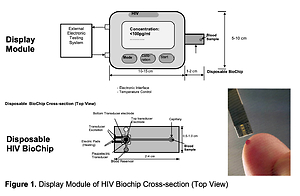Current issue
Archive
Manuscripts accepted
About the Journal
Editorial office
Editorial board
Section Editors
Abstracting and indexing
Subscription
Contact
Ethical standards and procedures
Most read articles
Instructions for authors
Article Processing Charge (APC)
Regulations of paying article processing charge (APC)
INFECTIOUS DISEASES / EXPERIMENTAL RESEARCH
A low-cost diagnostic technology for HIV detection
1
Perelman School of Medicine, University of Pennsylvania, United States
2
Drexel University, United States
Submission date: 2021-05-11
Final revision date: 2021-10-13
Acceptance date: 2021-10-25
Online publication date: 2022-04-04
Corresponding author
KEYWORDS
TOPICS
ABSTRACT
Introduction:
A new detection model directed at the coordination and simplification of global HIV treatment is described in this paper. It provides both health workers and patients worldwide with important medical information regarding disease status in real time, at home. We developed an innovative monitoring technology that significantly streamlines HIV treatment strategies and thus leads to more effective control of HIV infection.
Material and methods:
This technology is built around an original bionanosensor (BNS) detection device, which utilizes piezoelectric technology to detect and track HIV infection within hours of initial exposure to this virus. The BNS device rapidly, and specifically, detects even low levels of HIV-1 p24 core protein within a small sample.
Results:
BNS assays were conducted with small volume samples (10–100 µl) in a 10–20 mm3 detection chamber, and results were obtained within 5–15 minutes of test initiation. This assay was able to detect of 0.3–3.0 ng/ml of p24 protein, which was validated with a parallel ELISA analysis. These levels are typically observed during the early onset of infection and/or in individuals undergoing HAART therapy.
Conclusions:
The BNS assay will provide a specific and personal health profile or health signature of HIV/AIDS patients. The potential applicability of the BNS for use in multiple clinical and point-of-care settings worldwide is considerable. It lowers the cost of HIV detection and treatment as well as significantly improves patients’ quality of live. Finally, this technology will provide a platform for the detection and treatment of numerous other viral infections and health conditions.
A new detection model directed at the coordination and simplification of global HIV treatment is described in this paper. It provides both health workers and patients worldwide with important medical information regarding disease status in real time, at home. We developed an innovative monitoring technology that significantly streamlines HIV treatment strategies and thus leads to more effective control of HIV infection.
Material and methods:
This technology is built around an original bionanosensor (BNS) detection device, which utilizes piezoelectric technology to detect and track HIV infection within hours of initial exposure to this virus. The BNS device rapidly, and specifically, detects even low levels of HIV-1 p24 core protein within a small sample.
Results:
BNS assays were conducted with small volume samples (10–100 µl) in a 10–20 mm3 detection chamber, and results were obtained within 5–15 minutes of test initiation. This assay was able to detect of 0.3–3.0 ng/ml of p24 protein, which was validated with a parallel ELISA analysis. These levels are typically observed during the early onset of infection and/or in individuals undergoing HAART therapy.
Conclusions:
The BNS assay will provide a specific and personal health profile or health signature of HIV/AIDS patients. The potential applicability of the BNS for use in multiple clinical and point-of-care settings worldwide is considerable. It lowers the cost of HIV detection and treatment as well as significantly improves patients’ quality of live. Finally, this technology will provide a platform for the detection and treatment of numerous other viral infections and health conditions.
We process personal data collected when visiting the website. The function of obtaining information about users and their behavior is carried out by voluntarily entered information in forms and saving cookies in end devices. Data, including cookies, are used to provide services, improve the user experience and to analyze the traffic in accordance with the Privacy policy. Data are also collected and processed by Google Analytics tool (more).
You can change cookies settings in your browser. Restricted use of cookies in the browser configuration may affect some functionalities of the website.
You can change cookies settings in your browser. Restricted use of cookies in the browser configuration may affect some functionalities of the website.



